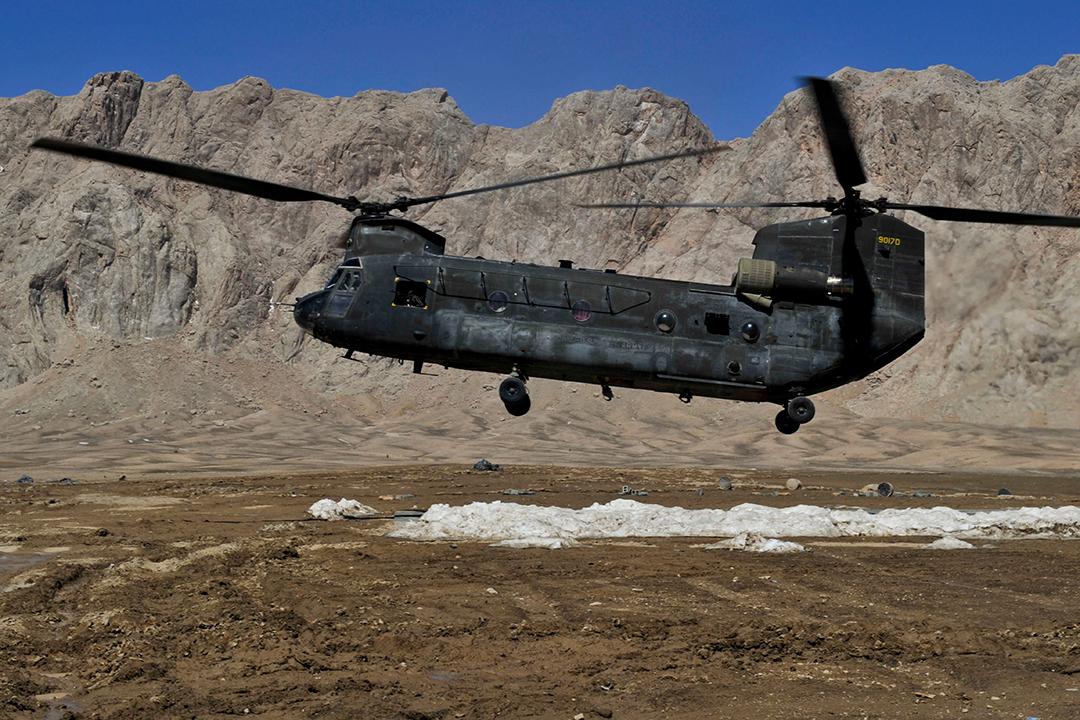
BERLIN—Boeing hopes to secure a contract early next year for Germany’s future fleet of Chinook transport helicopters as it works to finalize requirements for the rotorcraft.
Berlin selected the U.S. Army version of the CH-47 tandem-rotor aircraft for its Heavy Transport Helicopter (STH) requirement on June 1, after a long-running face-off against Sikorsky’s CH-53K King Stallion.
Germany plans to purchase 60 Block 2 CH-47Fs through the U.S. Foreign Military Sales (FMS) program with the Army and has budgeted €5.1 billion ($5.36 billion) for the CH-47s. Funding is to come from the newly established €100 billion German armed forces reequipment fund announced by Berlin in February and approved by the Parliament earlier this month.
Although the reequipment fund has been approved by lawmakers, individual programs will need separate Parliament agreements before contracts can be signed.
The Chinooks will replace Germany’s increasingly difficult-to-support VFW-Fokker license-built fleet of Sikorsky CH-53G Stallion helicopters that have been in service since the 1970s.
German Air Force Chinooks will differ from the U.S. Army models as each will have an aerial-refueling probe to enable connections with the Lockheed KC-130J Hercules and potentially the Airbus A400M airlifter configured as a tanker.
Their missions will include troop and equipment transport as well as combat search-and-rescue.
“We’re going to be working very closely with both our [U.S.] Army customer and our German customer and over the next 3-4 months. We’re going to be refining all the requirements so they coalesce into a program,” Mark Cherry, Boeing’s vice president and general manager for vertical lift, told journalists at the ILA Berlin Air Show here June 22.
“We’re looking forward to continuing this process and getting the helicopters under contract. . . . This has been a long, very challenging process,” Cherry says.
Germany’s decision came after a relaunch of the STH procurement following its cancellation in the summer of 2020. Germany’s defense materiel agency assessed the program as unaffordable in part because of the specifications Germany requested for the fleet. The tender then was resolicited through the FMS process.
Cherry echoes German defense ministry statements about the selection, saying the Chinook was chosen because of its affordability and European interoperability. The aircraft already is in use with regional allies Greece, Italy, the Netherlands and the UK.
“The war in Ukraine has highlighted the fact that all countries and coalitions will have to come together, mesh and work as one to be able to get the right capability as needed,” Cherry says.
Germany will be the second Block 2 customer after the UK, which has ordered 14 H-47 (Extended Range) model Chinooks. They are widely expected to be configured like MH-47Gs flown by U.S. Special Forces.
Boeing is remanufacturing small numbers of Block 1 CH-47Fs to the Block 2 standard for the U.S. Army. Company officials suggest the UK and German orders could form part of a Lot 3 production batch.
The OEM has established an industrial team in Germany to support the fleet. Among the companies involved are Aero-Bildung, Airbus, CAE, ESG, Honeywell, Lufthansa Technik and Rolls-Royce.
Airbus is expected to service the German Chinook fleet at its Military Support Center in Donauworth, which supports the CH-53s. Although Honeywell supplies the Chinook’s T55 powerplants, Rolls-Royce will perform the maintenance on the engines used by the German fleet.
